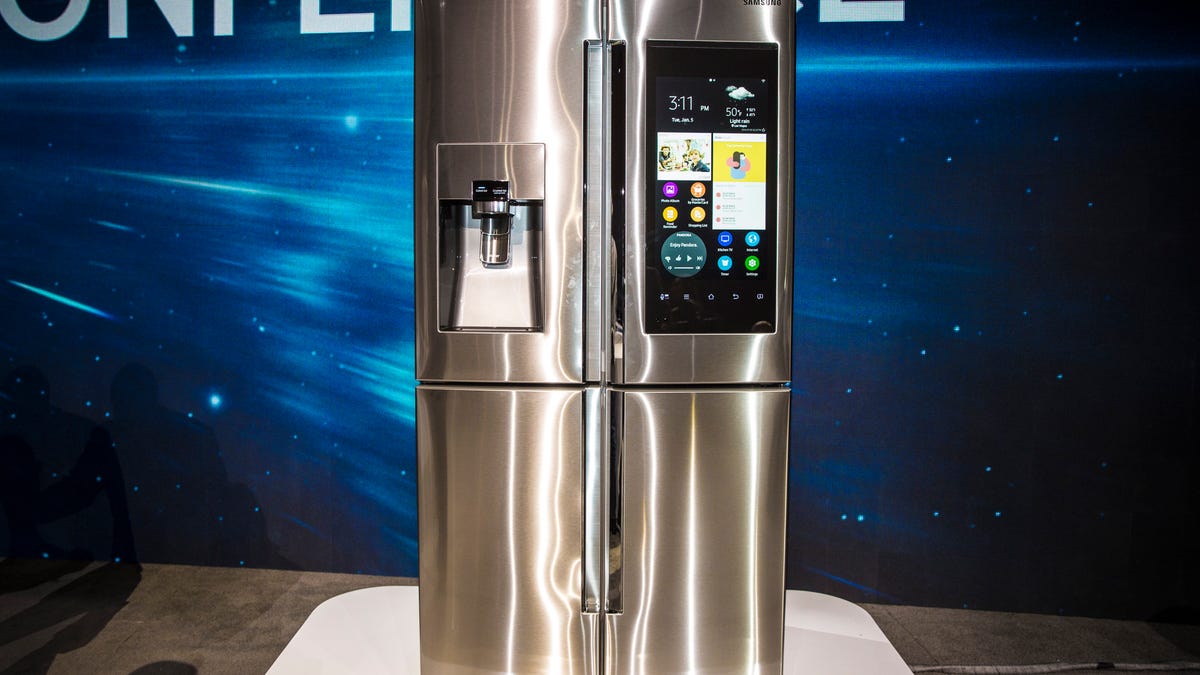Samsung's dilemma: How to future-proof a fridge
As appliances get smarter, it's tougher to make them last for decades. Here's what Samsung's considering to make sure the fridge you buy this year isn't obsolete next year.
You just shelled out $5,000 (£3,400, AU$7,000) for a new Samsung Family Hub Refrigerator. What do you do when the South Korean electronics giant rolls out a flashier, smarter version that can do so much more the following year?
Samsung's trying to figure that out.
Consumers tend to hold onto home appliances for a decade, if not longer. But the devices become tougher to future-proof as more and more smart capabilities get crammed into them. The smartest refrigerators available today -- like Samsung's new product, which features a 21.5-inch display for apps and cameras inside to tell you the fridge's contents -- may well look like dumb bricks compared to future models.
"Let's say four years from now, someone came out with an awesome application that's changing the way you interact [with your refrigerator]," Yoon C. Lee, the Samsung vice president who helps dream up the company's newest appliances, said in an interview at the 2016 Consumer Electronics Show in Las Vegas. "It's a whole new ballgame versus a five-year-old refrigerator doing a pretty decent job [maintaining] the freshness of food."
Samsung has faced this issue before with TVs. Consumers hang onto televisions much longer than their phones, tablets or computers, even though Samsung updates its sets each year with better processors and software. To give current users newer features, the company developed something it calls the "Evolution Kit." The devices allows television owners to update to the latest technology by switching out a box inside the TV, rather than the entire TV set.
Apple and wireless carriers also have a strategy for getting consumers to buy the latest model of mobile devices. Those companies offer upgrade programs that let consumers essentially rent a phone that can be traded in when the new model hits shelves. Samsung is expected to reveal a smartphone-leasing program of its own in the coming months.
Even automakers are addressing this issue. Audi, for instance, is working with chip supplier Qualcomm to build the brains of its cars in a modular box to make them easier to replace. "Every few years, even if you don't want to upgrade your car, you can pull the [components] board and put a new one in," Raj Talluri, senior vice president of product management for Qualcomm, said in an interview.
Of course, Samsung and other companies can deliver updates to their connected devices -- the so-called Internet of Things -- through software. But hardware also evolves, and Samsung hopes to one day to offer a refrigerator door, the smartest part of its new fridge, that's completely covered with an interactive, touchscreen display, Lee said.
What's holding Samsung back from achieving this are technical limitations, he said. If the display is larger than its current 21.5-inch size, it will interfere with the handle and technical elements, like thermal protection. And current display technology isn't flexible enough to match the shape of a refrigerator door. But Samsung is working on the technology and hopes to keep transforming home appliances.
It also wants to make the software more predictive and even smarter, doing things like alerting you that you're out of milk before you ask or telling you something in the fridge has been in there too long.
Samsung is looking at ways to update hardware by providing an Evolution Kit for appliances or even creating a door trade-in program (a maintenance worker could bring you the newest fridge door for a "nominal cost" and leave with the old), though the latter option's probably a long-shot. It's also exploring home appliance leasing programs, similar to what companies like Aaron's and Rent-A-Center offer.
But for now, you'll just have to be willing to part with that $5,000, knowing next year's fridge could be even better.
"The idea isn't to have the largest and greatest hardware that will last nine years," Lee said. "It's to give consumers a path to upgrade. What is that exactly? We don't have the exact solution yet."
Updated at 3 p.m. PT with comment from Qualcomm.


